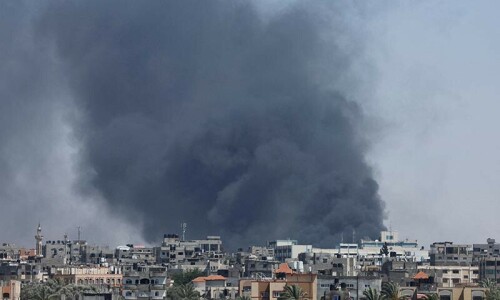IT was said in a matter-of-fact way and caused few ripples. Indeed, both the speaker and the audience seem to have accepted it as an inalterable reality of the state here. Speaking at the inauguration of a metro bus track between Islamabad and a new airport in Fatehjang catering to the capital region, Prime Minister Nawaz Sharif made some very frank observations. It is worth reproducing in full Mr Sharif’s remarks on corruption within the state apparatus. “There is so much corruption in the country that if we get involved in probing them all our time will be consumed in the investigations and we will not be able to deliver. There are so many scandals and frauds that they cannot even be listed. There are a number of projects which could not be completed in 20 years due to which their cost increased manifold,” the prime minister said.
Mr Sharif is both completely right and utterly wrong. In acknowledging the scope of corruption, the prime minister’s assessment is in line with that of most observers of the state here. Corruption is rampant and there are no parts of the state which have remained immune from this scourge. Where the prime minister is wrong is in his understanding of the government’s role in fighting it. Mr Sharif appears to believe that simply repeating over and over again that his government is different, that it does not indulge in dishonest dealings and that delivering projects on time or ahead of schedule is enough to dispel the perception of rampant corruption. But that ignores a fundamental responsibility of the government: to expose and punish corruption, and demonstrate through deeds, not words, that this menace is being seriously addressed.
One remarkable fact alone disproves the prime minister’s claim that his government takes fighting corruption seriously: there has not been a single case of a leading politician, whether in government or outside, who has been transparently investigated and fairly prosecuted for corruption. Indeed, stretching back through the decade-old transition to democracy, there is not one instance that can be cited where anyone of significance in the political class has been successfully prosecuted and a conviction upheld on appeal. With past corruption unpunished, there is no deterrence. Equally troubling is the PML-N government’s lack of transparency when it comes to handing out contracts and the reluctance to strengthen rules. In fact, government officials have routinely complained that onerous government rules make completing infrastructure and development projects on time difficult — an implicit acknowledgement that rules continue to be bent. Surely, the government must know that it has both a responsibility to deliver on its promises and to do so in a transparent, rules-based and corruption-free manner.
Published in Dawn, May 8th, 2017








































